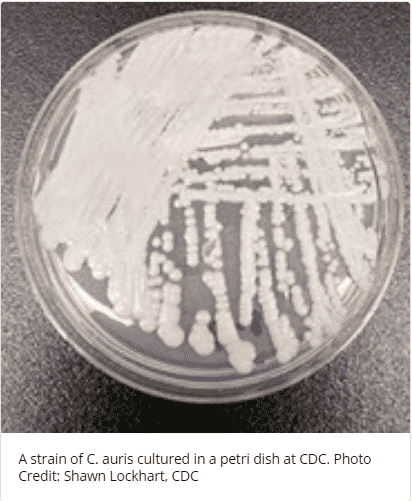New Cases of ‘Untreatable’ Superbug Fungus Emerge in U.S.

Centers for Disease Control and Prevention officials have reported domestic outbreaks of Candida auris, a deadly and highly transmissible yeast which can be resistant to all three major classes of antifungal medications before treatment.
Outbreaks of the fungus were discovered in a Dallas-area hospital and a long-term care facility that share patients and at a long-term care center in Washington, D.C., between January and April. The CDC had previously published a report on the fungus in 2017 that referred to it as a “global emerging threat.”
Most forms of Candida fungi do not spread from person to person, the CDC reports. However, C. auris can in fact last on skin and surfaces like bed rails and chairs for significant periods of time, meaning that the bug can spread from person to person in health care settings.
“Pan-resistant C. auris isolates have been reported previously, although rarely, from the United States and other countries,” CDC officials wrote in a recent Morbidity and Mortality Weekly Report. “Three pan-resistant C. auris cases reported in New York developed resistance following [antifungal] treatment and lacked epidemiologic links or common health care, suggesting that resistance resulted from antifungal pressure rather than via person-to-person transmission.”
The officials warned that the fungus is often resistant to multiple antifungal drugs commonly used to treat Candida infections and some strains were resistant to every existing class of antifungal drug. Echinocandins, for instance, are a class of antifungal drugs that noncompetitively inhibit a major component of the fungal cell wall.
Of 22 patients who suffered from the fungal outbreak in Dallas, two died from strains of the infection that resisted all classes of antifungal medications. Among 101 clinical cases identified through skin colonization screenings at a long-term care facility for severely ill patients in Washington, D.C., three had a strain of the infection that was extensively drug-resistant.
Since many of the deceased patients were already severely or terminally ill, it remains unclear how much of a part C. auris played in their demise.
“Since January 2021, however, the Antibiotic Resistance Laboratory Network has detected independent clusters of pan-resistant or echinocandin-resistant cases in Texas and the District of Columbia,” the report continued. “Each cluster involved common health care encounters and no known previous echinocandin exposure, suggesting transmission of pan- and echinocandin-resistant strains for the first time in the United States.”
C. auris is difficult for doctors to identify with standard laboratory methods, leading to misidentifications in labs without “specific technology,” according to the CDC webpage on the fungus. It is crucial for health care workers to properly and hastily identify the infection in hospitalized patients so that special precautions can be taken to curb its spread.
Although not all strains of the bug are resistant to the three drug classes used to treat fungal infections, most of the strains detected so far have been resistant to at least one drug, and more than one-third were resistant to two drug classes.
“These two simultaneous, independent clusters of pan- or echinocandin-resistant C. auris cases in patients with overlapping inpatient health care exposures and without previous echinocandin use provide the first evidence suggesting that pan- or echinocandin-resistant C. auris strains might have been transmitted in U.S. health care settings,” the CDC report continued. “Surveillance, public health reporting, and infection control measures are critical to containing further spread. Clinicians should consider early antifungal susceptibility testing in patients with C. auris infection, especially in those with treatment failure.”
























